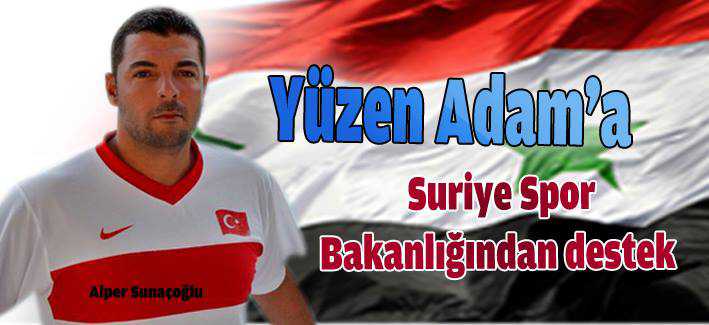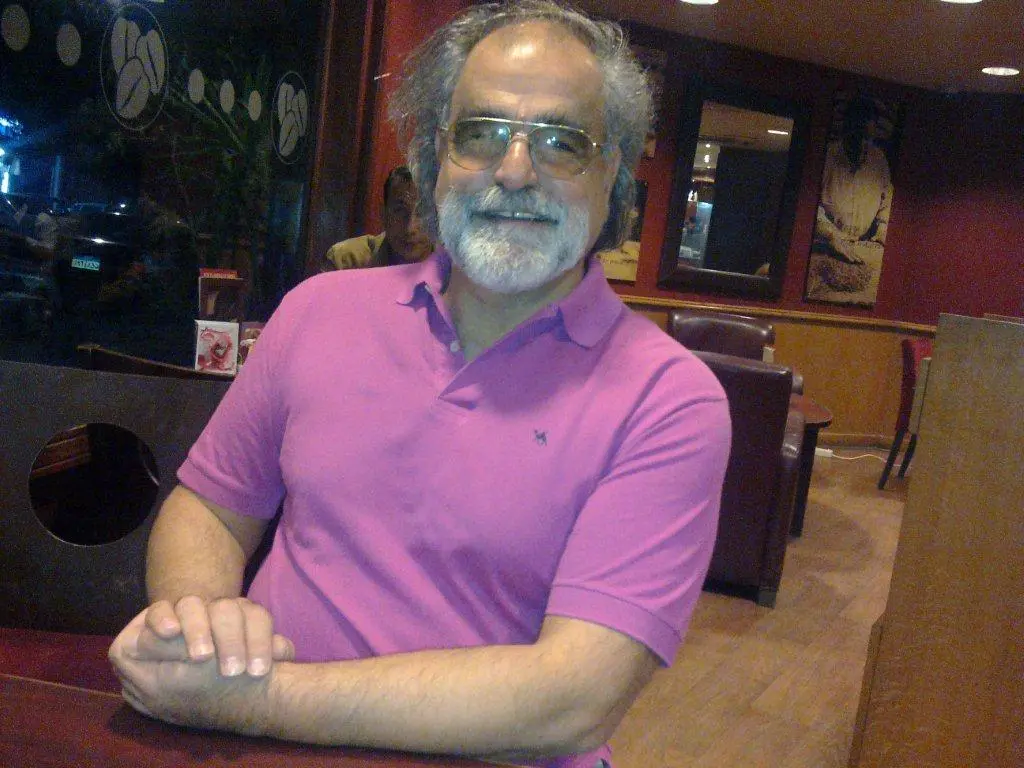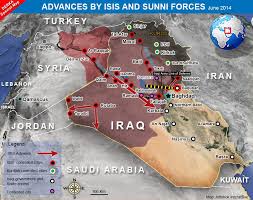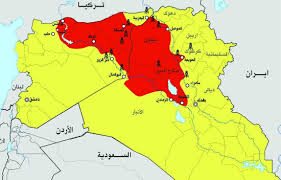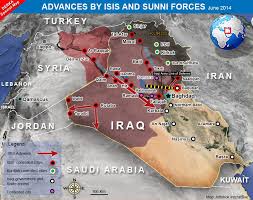Tag: Syria
-

U.S. Defense Secretary Chuck Hagel’s response on Syria: The United States respects the results

U.S. to release information about Syria’s chemical weapons use
(CNN) — The Obama administration will release declassified intelligence Friday backing up a government assessment that the Syrian regime was responsible for a chemical weapons attack, a senior administration official said.
[U.S. Defense Secretary Chuck Hagel’s response to the vote was more diplomatic.
The United States respects the results, he told journalists in Manila, the Philippines. “Every nation has a responsibility to make their own decisions.”
The United States will continue to consult with the British government and still hope for “international collaboration.”
“Our approach is to continue to find an international coalition that will act together,” he said .]
This comes amid talk among major powers of a military response against the forces of Syrian President Bashar al-Assad. The administration has said that the information would be made public by the end of the week.
But diplomatic and political developments this week raised the chances of the United States going it alone in a military intervention.
A U.N. Security Council meeting on Syria ended in deadlock, and in the U.S. Congress, doubts about military intervention are making the rounds.
And the United States’ closest ally, Great Britain, backed out of a possible coalition when its lawmakers voted down a proposal on military intervention.
British Prime Minister David Cameron said it is important for the United Kingdom to have a “robust response to the use of chemical weapons, and there are a series of things that (Britain) will continue to do.”British involvement in a military action “won’t be happening,” he said.
But diplomacy is continuing. Speaking in televised comments aired Friday, Cameron said he expects to speak to President Obama over the “next day or so.”
On Friday afternoon, U.N. Secretary-General Ban Ki-moon intends to consult with countries at the United Nations on developments in Syria and is scheduled to meet with permanent members of the U.N. Security Council at noon Friday.
U.S. Secretary of State John Kerry is scheduled to speak about Syria at the State Department on Friday at 12:30 p.m. ET.
Iran: U.S. military action in Syria would spark ‘disaster’
Alone or together?
After the British vote, a senior U.S. official, speaking on condition of anonymity, told CNN that going it alone was a real prospect.
“We care what they think. We value the process. But we’re going to make the decision we need to make,” the official said.
Former President George W. Bush said Obama’s “got a tough choice to make.”
“I was not a fan of Mr. Assad. He’s an ally of Iran, he’s made mischief,” he told Fox News on Friday. “If he (Obama) decides to use the military, he’s got the greatest military in the world backing him up.”
In a statement released Friday, former President Jimmy Carter said “a punitive military response without a U.N. Security Council mandate or broad support from NATO and the Arab League would be illegal under international law and unlikely to alter the course of the war.”
A former director of the CIA says he believes Obama would face off with al-Assad alone.
“I can’t conceive he would back down from a very serious course of action,” retired Gen. Michael Hayden told CNN’s Wolf Blitzer.
[…]
Chemical weapons in Syria: How did we get here?
The government of France supports military intervention, if evidence incriminates the government of using poison gas against civilians.
But on Friday, President Francois Hollande told French newspaper Le Monde that intervention should be limited and not include al-Assad’s overthrow.
Public opinion
Skeptics of military action have pointed at the decision to use force in Iraq, where the United States government under Bush marched to war based on a thin claim that former dictator Saddam Hussein was harboring weapons of mass destruction.
Opponents are conjuring up a possible repeat of that scenario in Syria, though the intelligence being gathered on the use of WMDs in Syria may be more sound.
Half of all Americans say they oppose possible U.S. military action against Syria, according to an NBC News survey released Friday.
Nearly eight in 10 of those questioned say Obama should be required to get congressional approval before launching any military attack against al-Assad’s forces
The poll, conducted Wednesday and Thursday, indicates that 50% of the public says the United States should not take military action against Damascus in response to the Syrian government’s alleged use of chemical weapons against its own citizens, with 42% saying military action is appropriate.
But the survey suggests that if any military action is confined to air strikes using cruise missiles, support rises. Fifty percent of a smaller sample asked that question say they support such an attack, with 44% opposing a cruise missile attack meant to destroy military units and infrastructure that have been used to carry out chemical attacks.
“Only 25% of the American people support military action in Syria,” former U.S. Ambassador to the United Nations Bill Richardson told CNN’s Piers Morgan on Thursday.
Convincing evidence
To shake off the specter of the Iraq war, the public needs convincing that chemical weapons were used and that al-Assad’s regime was behind it.
“You have to have almost incontrovertible proof,” Richardson told CNN’s Piers Morgan on Thursday.
It’s there, said Arizona Sen. John McCain, and will be visible soon. He thinks that comparisons to Iraq are overblown and that doubts are unfounded.
“Come on. Does anybody really believe that those aren’t chemical weapons — those bodies of those children stacked up?” the Republican senator asked Morgan.
Al-Assad’s government has claimed that jihadists fighting with the opposition carried out the chemical weapons attacks on August 21 to turn global sentiments against it.
Read UK intelligence on chemical weapons
McCain doesn’t buy it.
“The rebels don’t have those weapons,” he said.
The president also needs to assure Congress that a possible intervention would not get out of hand, said Democratic Rep. Chris Van Hollen of Maryland.
“The action has to have a very limited purpose, and the purpose is to deter future use of chemical weapons,” he said.
Why Russia, Iran and China are standing by al-Assad
Haunted by Iraq
The parliamentarians in London shot down the proposal in spite of intelligence allegedly incriminating the Assad government.
Britain’s Joint Intelligence Committee has concluded it was “highly likely” that Syrian government forces used poison gas outside Damascus last week in an attack that killed at least 350 people, according to a summary of the committee’s findings released Thursday.
A yes vote would not have sent the UK straight into a deployment.
Cameron had said his government would not act without first hearing from the U.N. inspectors and giving Parliament another chance to vote on military action. But his opposition seemed to be reminded of the Iraq war.
Opinion: For the U.S., Syria is a problem from hell
“I think today the House of Commons spoke for the British people who said they didn’t want a rush to war, and I was determined we learned the lessons of Iraq, and I’m glad we’ve made the prime minister see sense this evening,” Labour Party leader Ed Miliband told the Press Association.
The no vote came after a long day of debate, and it appeared to catch Cameron and his supporters by surprise.
For days, the prime minister has been sounding a call for action, lending support to talk of a U.S.- or Western-led strike against Syria.
“I strongly believe in the need for a tough response to the use of chemical weapons, but I also believe in respecting the will of this House of Commons,” the prime minister said.
“We will not be taking part in military action,” Cameron said Friday. “The British Parliament has spoken very, very clearly,” he said.
Though Cameron did not need parliamentary approval to commit to an intervention, he felt it important “to act as a democrat, to act a different way to previous prime ministers and properly consult Parliament,” he said Friday.
He regrets not being able to build a consensus of lawmakers, he said.
Letter from al-Assad
Before the vote, Syria’s government offered its own arguments against such an intervention. In an open letter to British lawmakers, the speaker of Syria’s parliament riffed on British literary hero William Shakespeare, saying: “If you bomb us, shall we not bleed?”
But the letter also invoked Iraq, a conflict justified on the grounds that Iraq had amassed stockpiles of chemical and biological weapons and was working toward a nuclear bomb — claims that were discovered to have been false after the 2003 invasion.
“Those who want to send others to fight will talk in the Commons of the casualties in the Syrian conflict. But before you rush over the cliffs of war, would it not be wise to pause? Remember the thousands of British soldiers killed and maimed in Afghanistan and Iraq, not to mention the hundreds of thousands of Iraqi dead, both in the war and in the continuing chaos.”
British Commons Speaker John Bercow published the letter.
U.N. deadlock
Lack of support for military intervention at the United Nations on Thursday was less of a surprise.
Russia, which holds a permanent seat on the U.N. Security Council, is one of Syria’s closest allies and is most certain to veto any resolution against al-Assad’s government that involves military action.
Moscow reiterated the stance Friday.
“Russia is against any resolution of the U.N. Security Council, which may contain an option for use of force,” Deputy Foreign Minister Gennady Gatilov said Friday.
Map: U.S. and allied assets around Syria
A closed-door Security Council meeting called by Russia ended with no agreement on a resolution to address the growing crisis in Syria, a Western diplomat told CNN’s Nick Paton Walsh on condition of anonymity.
U.N. weapons inspectors are now in Syria trying to confirm the use of chemical weapons. The inspectors are expected to leave the country by Saturday morning.
They are to brief U.N. Secretary-General Ban Ki-moon, who, in turn, will swiftly brief the Security Council on the findings.
Congressional jitters
The president is facing doubts at home as well: More than 160 members of Congress, including 63 Democrats, have now signed letters calling for either a vote or at least a “full debate” before any U.S. action.
The author of one of those letters, Democratic Rep. Barbara Lee of California, said Obama should seek “an affirmative decision of Congress” before committing American forces.
More than 90 members of Congress, most of them Republican, signed another letter by GOP Rep. Scott Rigell of Virginia. That letter urged Obama “to consult and receive authorization” before authorizing any such military action.
Congress is in recess until September 9.
White House spokesman Josh Earnest said Obama was still weighing a potential response to the chemical weapons attacks.
The president has said that he is not considering a no-fly zone and has ruled out U.S. boots on the ground in Syria.
Al-Assad has vowed to defend his country against any outside attack.
UK Government’s legal position on Syrian regime’s chemical weapon use
-
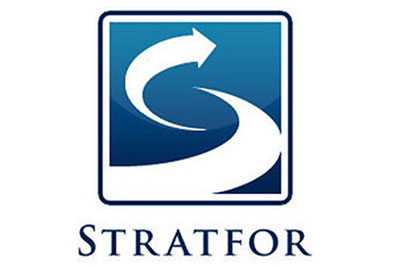
Geopolitical intelligence firm Stratfor on Syria
 Stratfor published a short statement relating to Syria.
Stratfor published a short statement relating to Syria.Here is the statement: At a time when countries are about to go to war–your own included–being unaffected by fear and passion is a critical professional stance. What Stratfor is proudest of is this: we know what we know. We know what we don’t know. And we don’t substitute opinion to fill in the blanks.
Stratfor’s job is to analyze the world as objectively as possible, and the situation in Syria is among the most difficult we have seen. The problem is we really don’t know what happened. The general consensus is Syrian President Bashar Assad ordered the use of chemical weapons against his enemies. The problem is trying to figure out why he would do it. He was not losing the civil war. In fact, he had achieved some limited military success recently. He knew that U.S. President Obama had said the use of chemical weapons would cross a red line. Yet Assad did it.
Or did he? Could the rebels have staged the attack in order to draw in an attack on al-Assad? Could the pictures have been faked? Could a third party, hoping to bog the United States down in another war, have done it? The answers to these questions are important, because they guide the U.S. and its allies’ response. The official explanation could be absolutely true–or not.
We can’t shy away from alternative explanations simply because they seem outlandish and conspiratorial. Nor can we embrace them. Stratfor’s job is to know what it knows, know what it doesn’t know and be honest about it.
-
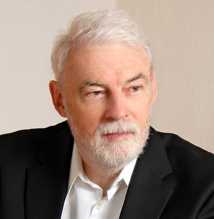
UNDER OCCUPATION: A MANIFESTO
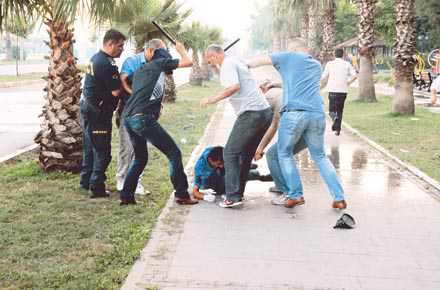
The government of Turkey, in primary collaboration with the government of the United States of America, has dared to attempt to destroy the duly constituted government of Syria. In that process it has funded, encouraged and armed a motley gang of terrorist killers that include numerous members of Al-Qaeda and other recognized terrorist groups. The Hatay region of Turkey is being used as a staging area for attacks on a neighboring country, a country that until relatively recently had enjoyed great favor with Turkey. Hatay, perhaps the most enlightened, peaceful region in Turkey, now is under occupation by gangs of terrorist killers. The people are regularly accosted on the streets by these ruffians, and asked if they are Alevites. You will be next, they are told. This anti-Alevite dialogue is fostered by divisive statements made by the Turkish government.
In 2012, a rash of hate crimes broke out in Turkey against members of the Alevite religious sect (20 million in Turkey), an enlightened, modern-thinking branch of Islam. (It is important to note that there is a long, violent history of hate crimes committed against the Alevites in Turkey.) Last year, verbal insults, beatings, and the painting of threats on houses spread throughout the country. Inexplicably, there were no statements of warning, concern or reproach issued by the government. Making matters worse and fanning the flames of violence, the prime minister called the houses of worship of the Alevites “ucube,” a “freak.” Clearly this should have been deemed as “hate speech” and punished as such under the provisions of the International Covenant on Civil and Political Rights, Article 20 (as ratified by The Republic of Turkey on 23 September 2003). Interestingly, Turkey, a majority Sunni Islamic country, has no specific hate crimes laws.
And there are many Alevites in Syria. Many innocent Syrian people have been murdered by this assembled-in-Turkey terrorist machine. Moreover, the citizens of Hatay are daily threatened by these terrorist gangs that the government of Turkey has organized, of course, with the help of the CIA, proven by history to be experts in unspeakably violent subversions. These crimes are well known and now well-documented. This lawless behavior, indeed a crime against the Syrian people, and a war crime in terms of the Geneva Conventions, is the supreme insult to all truth, all justice, all morality and all religion.
As these government and foreign operatives have dared to drag the Turkish people through their filth of deceit, lies and murder, so shall I dare. Dare to tell the truth, since the normal channels of the media and the Turkish justice system have failed so miserably to do so. If people fail to speak out they become accomplices to this murderous travesty of justice. But there is more to this, much more.
At the root of it all is one man, Recep Tayyip Erdoğan. A man of great ambition and great scowls. A perpetrator of epic police violence against the peaceful Gezi Parl protesters, he and his henchmen were also revealed to be epic story tellers. The entire world has witnessed their performance so there is little to add. Since he came to power he has relentlessly embarked on a policy to divide and weaken the republic. Who is this man, Erdoğan? Or as Cassius asked the reluctant assassins of Julius Caesar, “Upon what meat doth this our Caesar feed, that he is grown so great?”
In the Turkish case I suspect American hamburgers and hotdogs. For he and his ilk are of them. And now, during these days of tragedy, there are no longer any secrets. The truth is as bare as an eyeball hanging from its socket. Blood and death in the Turkish streets, poisonous pepper gas supplied by valiant allies like America and Brazil. Government street thugs wielding machetes. Beatings, clubbings, mass arrests. Roundups of lawyers, physicians, anyone who provided humanitarian aid to the protesters. Savage reprisals are now in full sway. And threats, threats, threats.
And of late, the finish of the destruction of the Turkish military, for how else to divide and reparcel the once integral Republic of Turkey in order to conform to the dictates of its American master’s pipe dream of regional stability? The ludicrous show trials called Ergenekon and its related fantasies that polluted all concept sof legal jurisprudence. Hundreds falsely imprisoned: military officers, journalists, writers, academicians. Secret witnesses, false testimony admitted without cross-examination. Lawyers jailed for making procedural objections in court. It all boils down to two words, justice raped.
Turkey is a nation held captive by the not-so-secret Obama-Erdoğan cabal. This is aided and abetted by its foreign policy, intelligence and espionage operations, and includes nongovernmental freelance organizations, both financial and mercenary. It is a stunning and deceitful array of destructive operators. The target? To destroy Turkish secularity, replacing it with a post-modern blend of religious fascism and uneducated compliance, a lethal long-term cocktail indeed. But they are adamant to once and for all create a compliant Turkish puppet state. And that’s where Erdoğan comes in. And Mustafa Kemal Atatürk departs. And that’s where Turkey is today, under occupation by a cabal of domestic ruling (AKP) and foreign (USA) powers. The army secular leadership is in jail. The police are feral and rabidly loyal to the ruling power. The situation is dire.
But we in Turkey do live in a wider world though this is rarely obvious in the discourses of the two occupying powers. And, believe it or not, there are indeed laws that are upheld and enforced in this wider world. Below are a few that are being violated by the prime minister of Turkey and the President of the United States and the members of their cabal. The dimensions are of Hitlerian proportions which was the motive force for establishing many of these laws and protocols. We, the real people of the real world, should demand their enforcement. The nightmare is here. It is time.
James (Cem) Ryan, Ph.D.
Istanbul
14 August 2013LAWS AND PROTOCOLS BEING VIOLATED
UNITED NATIONS GENERAL ASSEMBLY RESOLUTION 3314: Definition of Aggression
Aggression is the use of armed force by a State against the sovereignty, territorial integrity or political independence of another State, or in any other manner inconsistent with the Charter of the United Nations.
INTERNATIONAL COVENANT ON CIVIL AND POLITICAL RIGHTS
Article 20.
1. Any propaganda for war shall be prohibited by law.
2. Any advocacy of national, racial or religious hatred that constitutes incitement to discrimination, hostility or violence shall be prohibited by law.
NUREMBERG TRIBUNAL CHARTER
The Tribunal established by the Agreement referred to Article 1 hereof for the trial and punishment of the major war criminals of the European Axis countries shall have the power to try and punish persons who, acting in the interests of the European Axis
countries, whether as individuals or as members of organizations, committed any of the following crimes. The following acts, or any of them, are crimes coming within the jurisdiction of the Tribunal for which there shall be individual responsibility:
(a) Crimes Against Peace: namely, planning, preparation, initiation or waging of a war of aggression, or a war in violation of international treaties, agreements or assurances, or participation in a common plan or conspiracy for the accomplishment of any of the foregoing;
(b) War Crimes: namely, violations of the laws or customs of war. Such violations shall include, but not be limited to, murder, ill-treatment or deportation to slave labor or for any other purpose of civilian population of or in occupied territory, murder or ill-treatment of prisoners of war or persons on the seas, killing of hostages, plunder of public or private property, wanton destruction of cities, towns or villages, or devastation not justified by military necessity;
(c) Crimes Against Humanity: namely, murder, extermination, enslavement, deportation, and other inhumane acts committed against any civilian population, before or during the war; or persecutions on political, racial or religious grounds in execution of or in connection with any crime within the jurisdiction of the Tribunal, whether or not in violation of the domestic law of the country where perpetrated. leaders, organizers, instigators and accomplices participating in the formulation or execution of a common Plan or conspiracy to commit any of the foregoing crimes are responsible for all acts performed by any persons in execution of such plan.
Note: the above provisions were codified as legal principles by the International Law Commission of the United Nations.
PROTOCOL ADDITIONAL TO THE GENEVA CONVENTIONS OF 12 AUGUST 1949, AND RELATING TO
THE PROTECTION OF VICTIMS OF INTERNATIONAL ARMED CONFLICTS (PROTOCOL 1) (2ND PART)
Article 50. Definition of civilians and civilian population
1. A civilian is any person who does not belong to one of the categories of persons referred to in Article 4 A (1), (2), (3) and (6)
of the Third Convention and in Article 43 of this Protocol. In case of doubt whether a person is a civilian, that person shall be considered to be a civilian.
2. The civilian population comprises all persons who are civilians.
3. The presence within the civilian population of individuals who do not come within the definition of civilians does not deprive the population of its civilian character.Article 51. Protection of the civilian population
1. The civilian population and individual civilians shall enjoy general protection against dangers arising from military operations. To give effect to this protection, the following rules, which are additional to other applicable rules of international law, shall be observed in all circumstances.2. The civilian population as such, as well as individual civilians, shall not be the object of attack. Acts or threats of violence the primary purpose of which is to spread terror among the civilian population are prohibited.
3. Civilians shall enjoy the protection afforded by this Section, unless and for such time as they take a direct part in hostilities.
4. Indiscriminate attacks are prohibited. Indiscriminate attacks are:
(a) Those which are not directed at a specific military objective;
(b) Those which employ a method or means of combat which cannot be directed at a specific military objective;
(c) Those which employ a method or means of combat the effects of which cannot be limited as required by this Protocol; and
consequently, in each such case, are of a nature to strike military objectives and civilians or civilian objects without distinction.5. Among others, the following types of attacks are to be considered as indiscriminate:
(a) An attack by bombardment by any methods or means which treats as a single military objective a number of clearly separated
and distinct military objectives located in a city, town, village or other area containing a similar concentration of civilians or civilian objects; and
(b) An attack which may be expected to cause incidental loss of civilian life, injury to civilians, damage to civilian objects, or a combination thereof, which would be excessive in relation to the concrete and direct military advantage anticipated.
6. Attacks against the civilian population or civilians by way of reprisals are prohibited.
7. The presence or movements of the civilian population or individual civilians shall not be used to render certain points or areas immune from military operations, in particular in attempts to shield military objectives from attacks or to shield, favour or impede military operations. The Parties to the conflict shall not direct the movement of the civilian population or individual civilians in order to attempt to shield military objectives from attacks or to shield military operations.
8. Any violation of these prohibitions shall not release the Parties to the conflict from their legal obligations with respect to the civilian population and civilians, including the obligation to take the precautionary measures provided
for in Article 57.
Article 52. General protection of civilian objects
1. Civilian objects shall not be the object of attack or of reprisals. Civilian objects are all objects which are not military objectives as defined in paragraph 2.
2. Attacks shall be limited strictly to military objectives. In so far as objects are concerned, military objectives are limited to those objects which by their nature, location, purpose or use make an effective contribution to military action and whose total or partial destruction, capture or neutralization, in the circumstances ruling at the time, offers a definite military of advantage.
3. In case of doubt whether an object which is normally dedicated to civilian purposes, such as a place of worship, a house or other dwelling or a school, is being used to make an effective contribution to military action, it shall be presumed not to be so used.
Article 57. Precautions in attack
1. In the conduct of military operations, constant care shall be taken to spare the civilian population, civilians and civilian objects.
2. With respect to attacks, the following precautions shall be taken:
(a) Those who plan or decide upon an attack shall:
(i) Do everything feasible to verify that the objectives to be attacked are neither civilians nor civilian objects and are not subject to special protection but are military objectives within the meaning of paragraph 2 of Article 52 and that it is not prohibited by the provisions of this Protocol to attack them;
(ii) Take all feasible precautions in the choice of means and methods of attack with a view to avoiding, and in any event to minimizing, incidental loss of civilian life, injury to civilians and damage to civilian objects;THE NUREMBERG PRINCIPLES
These principles define a crime against peace as the “planning, preparation, initiation or waging of a war of aggression, or a war in violation of international treaties, agreements, or assurances, or participation in a common plan or conspiracy for accomplishment of any of the forgoing.”
INTERNATIONAL CRIMINAL COURT
Rules of Procedure and Evidence
U.N. Doc. PCNICC/2000/1/Add.1 (2000).
http://hrlibrary.umn.edu/instree/iccrulesofprocedure.html -
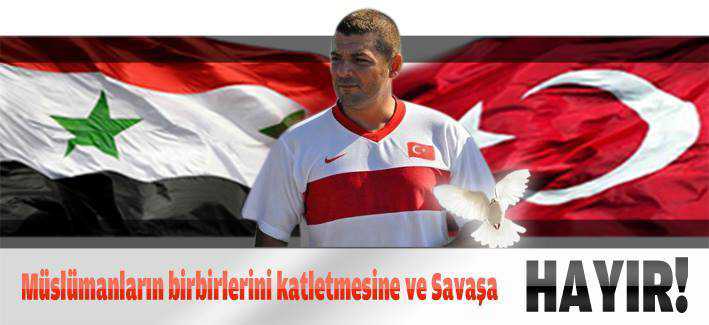
The Record-holder Swimmer in the Mediterranean Sea for Peace and Brotherhood
 Alper Sunaçoğlu who is known for his records in swimming and performance sports will swim in Mediterranean on 30th of August 2013 and will start swimming from Samandağ Hatay for the respect to the basic fundamental rights, freedoms and to say no to war, death and captivity.
Alper Sunaçoğlu who is known for his records in swimming and performance sports will swim in Mediterranean on 30th of August 2013 and will start swimming from Samandağ Hatay for the respect to the basic fundamental rights, freedoms and to say no to war, death and captivity.In the past Alper SUNAÇOĞLU swam the distance of 78 km from Mersin to Cyprus without using safety cage and broke the world record with a whopping short limit of time 26 hours 15 minutes.
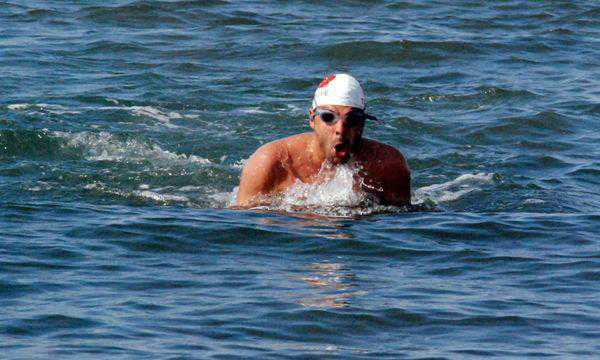
On 23th of April 2011 Mr. Sunaçoğlu swam across Istanbul Bosphorus at full length in 2 hours 25 minutes and after that on 29th of October 2012 and last year, the marathon swimmer again broke a new world record in Dardenelles in 7 hours 12 minutes .
Furthermore our sportsman greeted the Mavi Marmara at the offshores of Marmara Sea and escorted the Mavi Marmara flotilla until it reached the offshores of Sarayburnu in order to protest the brutality of Israel and to call for attention to the inhumanities that take place in Gazze, Palestine.
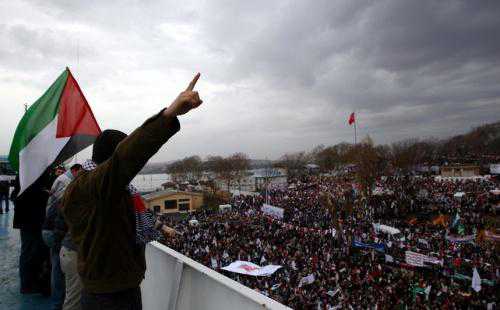
After all Alper wanted to swim from Port Said of Egypt to Gazze but this was cancelled with the official written order of Ministry of Foreign Affairs for security reasons due to the civil riots in Egypt that erupted at the time.
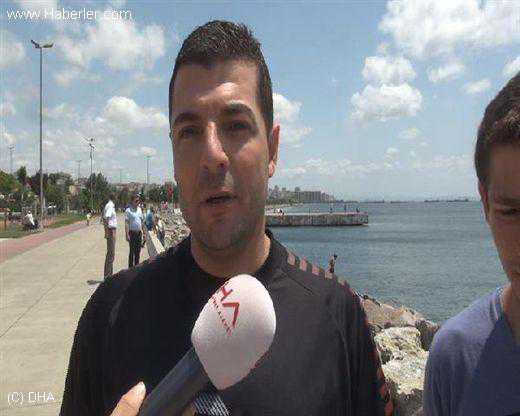
On 30 th of August 2013 the activist sportsman Mr. Sunaçoğlu and his friend Bedirhan Karabağ will start swimming from the coast of Antakya to the Syria where there is a war and deaths. . Sunaçoğlu will swim to Syria in order to give peace message and will say no to the cruelty, death, captivity, torture and to call for attention for the peace and for the respect to basic fundamental rights and freedoms at Mediterranean Sea which is a sea of Muslims.
Lets pay attention to what Alper Sunaçoğlu has to say about this extraordinary project.
Tolga: Firstly I would to thank you that you that you have kindly spared your time to us in your busy schedule.
When did you start swimming and become a long-distance swimmer? When you swim don’t you ever get bored or scared?
SUNAÇOĞLU: I have been swimming since I have known myself. I feel that I am a part of the sea while swimming and it’s like a kind of worship.
You are on your own and with the God in an unguarded environment and the only option you have is to trust God who will arrange things for the best.
In order to understand what I really mean you have to try what I do. Just swim 500 metres from the coast and wait.. No one can see and hear you.. You are alone.. There is only God, you and sea.. Moreover the host of the sea and the living creatures of course.
Tolga: One day I will definately try 🙂
On the recent headlines you were about to swim the English Channel. Why is this cancelled? It is heard that you refused the sponsorship of the Governorship fo Istanbul. Could you give us more detailed information relating to this event to enlighten your followers and our readers?
SUNAÇOĞLU: My project was to swim across the English Channel which is 36 km course and known for its extreme currents and freezing water temperatures in less than 7 hours to break the world record however I have postponed this due to the problems that the Turkey face as well as private private reasons. Now my aim is to break the world record in 2014. As part of the sponsorship we agreed in principle with governorship however after the Gezi Park protests I thougt that it will make sense, more logical and better to postpone this to the next year.
Tolga: Don’t you ever get afraid of sharks in the sea? Have you ever seen them before? Especially Mediterranean Sea seems to be very risky. What do you think?
SUNAÇOĞLU: I can’t say I am not afraid but I know how to control my fear. I have seen them before and I know I will see them in the future. But there were no threat or attack so far and I certainly hope there won’t 🙂
Tolga: Recently you made a protest under the name of Yüzen Adam. You and Bedirhan Karadağ swam across 30 km sourroundings of Büyük Ada together with the support of Gürsel Tekin and some members of parliament. And now the last stop of the protest is Antakya, is there any speacial reason to end this protest up in Antakya? What is the rela reason behind the attempt of swimming across from Antakya to Syria? What is the real aim of this protest?
SUNAÇOĞLU: I would like a world which shows respect to fundamental rights and freedoms. I accept mankind as it is no matter for me what language, religion and ethnic origin they have. I do not want a war, blood, death, violence and empire of fear. As the prime minister Tayyip Erdoğan said, ” There might be foreign powers influences or some monkey business” but once for all there is unrest, war, fear in Middle East and Muslim Sea of Mediterranean Sea. I protest the Muslims’ killing of each other. I am not the man of someone, some power or serve anyone. I am not the supporter of any political party and I don’t earn any money, on the contrary I have faced many loses materially and spiritually. I only use my individusl democratic rights for action. I hope that this works and I can contribute and lead to form common sense in this region of the world. This is my unique aim. In short they say”A good deed is its own reward”.
My aim is to support peace and brotherhood of mankind. And if the conditions are convenient I would like to go the place where Turkish aircraft crashed and stand at attention in order to show respect by raising the Turkish flag. I hope that God allows me for this so that I can achieve this and return home to Turkey safe and sound.
Tolga: Who will you meet you at Syria ashore? What is your message to Syria?
SUNAÇOĞLU: There is nothing clear about it and it is not important who will meet me however it is sufficient enough for me that this someone is a human being as I will be there as an activist with a peace message to declare to the whole world. My message is unifier not seperatist “I want respect to right to life. As a member of Turkish Republic and as a part od nation which destroyed many of its enemies in wars along in its long history, I will make a cross-border marathon swimming without guns and defence. I believe that my message will be effective enough against foreign powers or some monkey business in World. My message and philosophy is this “Turks are neither afraid of war nor peace”
Tolga: As we can see and understand you are determined exactly just like before you swam to Cyprus, I can see the same courage and determination in your eyes. I hope that everything you wish will happen and you raise full awareness on behalf of peace and brotherhood. Good luck YÜZEN ADAM…
SUNAÇOĞLU: I would to kindly thank you for giving me a chance to share my protest with public opinion and thank you for your sensitivity. Let’s hope for the best for Turkey and World. I would like to take this opportunity to say happy Eid to Turkish People and local communities by hoping that this leads to brotherhood, peace, prosperity and unity wordwide.
